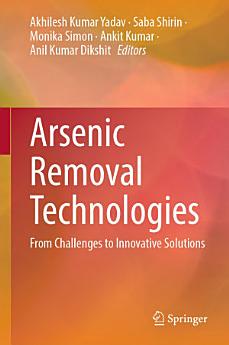Arsenic Removal Technologies: From Challenges to Innovative Solutions
About this ebook
Divided into 14 chapters, the book addresses topics such as bioremediation using microorganisms and natural plant-based systems, integrated bioremediation technologies, and the application of nanotechnology for enhanced efficiency and affordability. It also outlines the development and use of low-cost adsorptive materials and sustainable adsorbents, providing a comprehensive overview of their strengths, limitations, and future prospects. With a focus on both developed and developing countries, the book examines the current state of arsenic removal methods, the challenges faced, and the innovative solutions being developed. It highlights the importance of building capacity and knowledge sharing for sustainable arsenic management.
This book is an essential resource for researchers, environmental scientists, engineers, and policymakers working in the fields of environmental science, water treatment, and public health. It equips readers with a detailed and up-to-date perspective on the technologies and strategies needed to effectively mitigate arsenic pollution.
About the author
Akhilesh Kumar Yadav holds a Ph.D. in Environmental Engineering with a research focus on air pollution from the Indian Institute of Technology (BHU), Varanasi, India. He earned his B.Tech. in Electronics and Communication Engineering from Chaudhary Charan Singh University, Meerut, India, and his M.Tech. in Environmental Engineering from Madan Mohan Malaviya Engineering College, Gorakhpur, India. Dr. Yadav has extensive experience in environmental research, having served at prestigious institutions such as IIT (BHU), IIT Bombay, Bhabha Atomic Research Centre, and Chaoyang University of Technology in Taiwan. He has authored numerous research articles, book chapters, and holds a patent.
Saba Shirin completed her Ph.D. at IIT (BHU), Varanasi, India, and currently serves as Assistant Professor (OCFD) at Gautam Buddha University, Greater Noida, India. Her research interests include water and wastewater treatment, air quality, risk assessment, and environmental pollution. Dr. Shirin has published articles in peer-reviewed journals and actively participates in international and national conferences.
Monika Simon holds a Ph.D. in Environmental Science and Engineering from the Indian Institute of Technology Roorkee, India. She is currently working as a Research Associate in an international project.She received her B.Tech. in Biotechnology from Sam Higginbottom University of Agriculture, Technology, and Sciences, Allahabad, and M.Tech. in Environmental Engineering from Madan Mohan Malaviya University of Technology, Gorakhpur, India. With over four years of industrial experience in wastewater treatment.Her research focuses on microbial bioremediation, antimicrobial resistance, and sustainable water treatment. She has authored several research articles and book chapters and holds a patent in the field of wastewater treatment.
Ankit Kumar is an R&D manager at Lohum Cleantech Private Limited, specializing in the extraction of high-purity cobalt/nickel and rare earth metals from industrial byproducts. He holds a B.Tech., M.Tech., and Ph.D. in Chemical Engineering, with research dedicated to biomass utilization for energy production. His work primarily focused on catalyst development, particularly metal organic framework (MOF)-derived Ni-based catalysts, for efficient hydrogen (H2) production from bio-oil and its model compounds in a packed bed reactor. Dr. Kumar also has post-doctoral experience at IIT GN-India, further enhancing his expertise in environmental engineering.
Anil Kumar Dikshit is a Professor in the Environmental Infrastructure & Clean Tech (EICT) Group at the Indian Institute of Technology, Bombay, India. He also oversees the GIS Laboratory for Environmental Management & Sustainability (GEMS) within the Environmental Science and Engineering (ESE) Department. Dr. Dikshit earned his Ph.D. in Civil and Environmental Engineering from Cornell University, USA. His expertise spans environmental systems planning, water supply and wastewater engineering, and solid waste management. His research interests are diverse, encompassing environmental infrastructure, clean technology, urban and biomedical waste management, hazardous and electronic waste management, environmental modeling, optimization, impact assessment, sustainability, life cycle assessment, and GIS applications to water and environmental issues.




